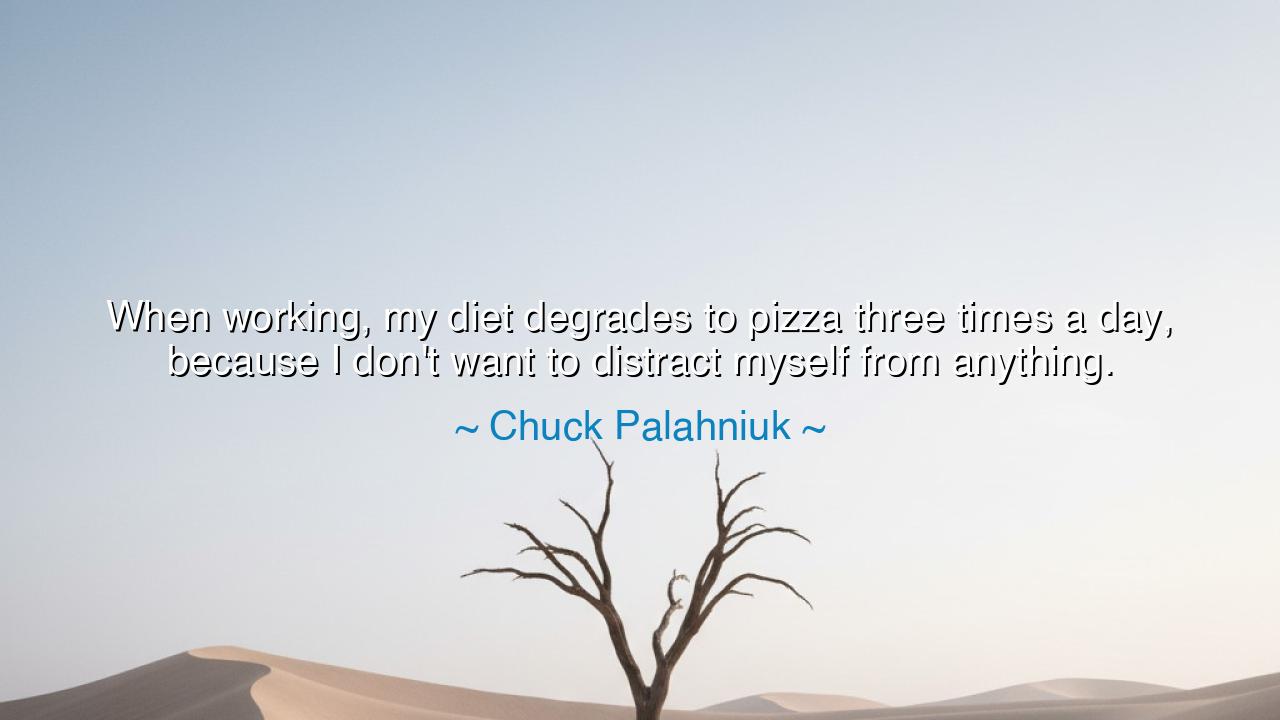
When working, my diet degrades to pizza three times a day
When working, my diet degrades to pizza three times a day, because I don't want to distract myself from anything.






When Chuck Palahniuk confessed, “When working, my diet degrades to pizza three times a day, because I don’t want to distract myself from anything,” he was not merely joking about poor nutrition—he was revealing the dark fire of obsession that burns in the heart of creation. Beneath his humor lies the truth that greatness often demands sacrifice, and that in the pursuit of one’s highest purpose, even the simplest acts—eating, resting, living—become secondary to the summons of the work. His words echo the eternal struggle between the mortal needs of the body and the immortal hunger of the soul. To the ancients, this was not madness—it was devotion, the kind that drives a craftsman, philosopher, or poet to give everything to the altar of their art.
In this declaration, Palahniuk speaks as one possessed by his craft. To “not want to distract myself from anything” is to enter the sacred realm of total focus, a state the Stoics called ataraxia, and the monks called single-mindedness of purpose. Yet the irony he wields so effortlessly—subsisting on pizza, the food of chaos—reveals the cost of this discipline. For every work that endures, there lies behind it a body neglected, a mind stretched thin, a life narrowed to a point of blinding concentration. He captures the paradox of the creative spirit: that to produce something eternal, one must sometimes live as if nothing else matters.
The ancients would have understood this fire well. Archimedes, when lost in the ecstasy of discovery, is said to have ignored food, drink, and even the approach of death itself. When Roman soldiers burst into his home, he did not plead for his life but whispered, “Do not disturb my circles.” In that moment, he too refused distraction, consumed by the perfection of the thought before him. Like Palahniuk, Archimedes had entered the realm where the material fades, and the mind becomes the universe’s vessel. His death was tragic—but his devotion immortal. From this lineage of thinkers, creators, and dreamers, Palahniuk draws his spirit: the willingness to endure discomfort for the sake of unbroken creation.
Yet there is also a warning buried in his words. For while focus can become sacred, neglect can become the shadow of genius. To eat the same meal three times a day, to reduce the body’s needs to an afterthought, is to risk imbalance—the same imbalance that has haunted many of history’s brightest lights. The poet Sylvia Plath wrote in hunger and sleeplessness until her art consumed her. The painter Van Gogh lived on bread and coffee while painting suns that burned brighter than life itself. Their brilliance was dazzling, but their sacrifice immense. Palahniuk’s remark, half jest and half confession, reminds us that obsession can fuel creation—but it can also hollow the vessel through which creation flows.
Still, there is nobility in his honesty. He does not glamorize suffering; he accepts it. The pizza, the monotony, the neglect—they are the self-inflicted disciplines of one who understands that every distraction carries a cost. His humor is armor, but his truth is raw: when the work calls, all else falls silent. This is the creed of the committed, the vow of those who build not for applause, but for eternity. To live this way is not for the faint of heart—it is to walk the razor’s edge between mastery and madness, between hunger for art and hunger for life itself.
And yet, the wise reader must discern the deeper lesson. For though Palahniuk’s devotion inspires, it also invites reflection. The ancients believed in balance—in sophrosyne, the virtue of moderation that binds passion with wisdom. Creation, they taught, must nourish the creator, not destroy him. To honor the craft is noble, but to forget the vessel is folly. The greatest masters—Da Vinci, Michelangelo, Confucius—found harmony between body and spirit, letting each feed the other. The body’s well-being is not an enemy of the mind; it is its foundation.
So, let this quote be both a torch and a mirror. It teaches that to achieve anything of worth, one must cultivate devotion, the discipline to silence distraction and give oneself wholly to the task. But it also reminds us to tend the flame without burning the wick—to feed the mind with passion while nourishing the body that carries it. For genius that starves the flesh may blaze brightly, but briefly. True mastery endures, steady and strong, like a temple built on both fire and stone.
Thus, take from Palahniuk’s words the ancient balance: focus, but do not forget yourself. Pursue your work with sacred hunger, but also remember to eat the bread of life. For the artist’s greatest triumph is not to finish a masterpiece, but to live long enough to create many.






AAdministratorAdministrator
Welcome, honored guests. Please leave a comment, we will respond soon